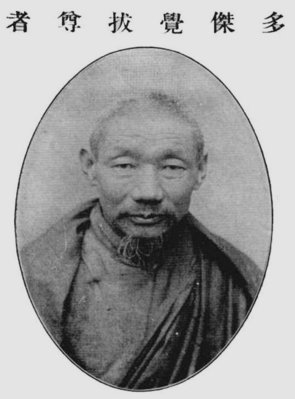Views
m |
m |
||
| Line 15: | Line 15: | ||
==Biography== | ==Biography== | ||
| - | Dorjé Chöpa trained at Drepung Monastery for two decades and earned his | + | Dorjé Chöpa trained at Drepung Monastery for two decades and earned his Geshé (Tib. dge bshes, Ch. gèxī 格西) degree there. He lived in Mongolia and made five trips to Mt. Wǔtái [[五台山]] in the first decades of the 20th century. Dorjé Chöpa moved to Běijīng [[北京]] in [[1925]] after the ninth Panchen Lama [[班禪]] relocated there. |
In Běijīng, Dorjé Chöpa became acquainted with Dàyǒng [[大勇]] and began teaching him and his students at the Buddhist Tibetan Language College [[藏文學院]]. That same year, the school closed when Dàyǒng, inspired by Dorjé Chöpa, turned the College into the Residing-in-Tibet Dharma Studies Group [[留藏學法團]] and departed for Tibet. After this, Dorjé Chöpa traveled to Hángzhōu [[杭州]], where he taught Tibetan Buddhism and gave initiations. | In Běijīng, Dorjé Chöpa became acquainted with Dàyǒng [[大勇]] and began teaching him and his students at the Buddhist Tibetan Language College [[藏文學院]]. That same year, the school closed when Dàyǒng, inspired by Dorjé Chöpa, turned the College into the Residing-in-Tibet Dharma Studies Group [[留藏學法團]] and departed for Tibet. After this, Dorjé Chöpa traveled to Hángzhōu [[杭州]], where he taught Tibetan Buddhism and gave initiations. | ||
| Line 34: | Line 34: | ||
==References== | ==References== | ||
| + | * Bianchi, Ester. "L'insegnamento tantrico del 'lama cinese' Nenghai (1886-1967). Inquadramen to storico e analisi testuale del corpus di Yamāntaka-Vajrabhairava." Ph.D. disst. Università Ca'Foscari di Venezia - Ecole des Hautes Etudes en Sciences Religieuses, 2003. | ||
* Tuttle, Gray. ''Tibetan Buddhism and the Making of Modern China.'' New York: Columbia University Press, 2005. Pp. 84-85. | * Tuttle, Gray. ''Tibetan Buddhism and the Making of Modern China.'' New York: Columbia University Press, 2005. Pp. 84-85. | ||
[[Category:Biography]] | [[Category:Biography]] | ||
Revision as of 04:06, 20 May 2010
Dorjé Chöpa (Duōjié juébá 多杰覺拔) (1874-19??)
|
|
Notable Associates:
|
|
Dorjé Chöpa (Duōjié juébá 多杰覺拔) (1874-19??) was the first fully ordained Tibetan monk to teach Chinese students about Tibetan Buddhism (Xīmì 西密) in the Republican period.
Contents |
Biography
Dorjé Chöpa trained at Drepung Monastery for two decades and earned his Geshé (Tib. dge bshes, Ch. gèxī 格西) degree there. He lived in Mongolia and made five trips to Mt. Wǔtái 五台山 in the first decades of the 20th century. Dorjé Chöpa moved to Běijīng 北京 in 1925 after the ninth Panchen Lama 班禪 relocated there.
In Běijīng, Dorjé Chöpa became acquainted with Dàyǒng 大勇 and began teaching him and his students at the Buddhist Tibetan Language College 藏文學院. That same year, the school closed when Dàyǒng, inspired by Dorjé Chöpa, turned the College into the Residing-in-Tibet Dharma Studies Group 留藏學法團 and departed for Tibet. After this, Dorjé Chöpa traveled to Hángzhōu 杭州, where he taught Tibetan Buddhism and gave initiations.
The following year he traveled to Hànkǒu 漢口 and started the Tantrayana Study Society 密乘學會 in Wǔchāng 武昌.
Notable Students
Notes
- ↑ Various back-transliterations have been made into Tibetan from this Lama's Chinese Name. See Tuttle, 265-266f.53.
References
- Bianchi, Ester. "L'insegnamento tantrico del 'lama cinese' Nenghai (1886-1967). Inquadramen to storico e analisi testuale del corpus di Yamāntaka-Vajrabhairava." Ph.D. disst. Università Ca'Foscari di Venezia - Ecole des Hautes Etudes en Sciences Religieuses, 2003.
- Tuttle, Gray. Tibetan Buddhism and the Making of Modern China. New York: Columbia University Press, 2005. Pp. 84-85.
